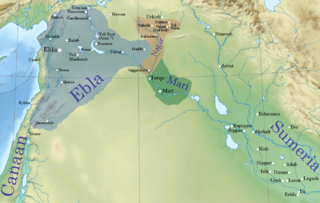Tall Bazi
Tall Bazi, is an ancient Near East archaeological site in Raqqa Governorate of Syria in the same general area as Mari and Ebla.
It is located on the east bank of Euphrates river in upper Syria, about 60 kilometers south of Turkey border.
Also nearby, about one half a kilometer to the south, the large Tell Banat Complex was located on the lower ground.
Around 1999, because of the construction of the Tishrin Dam nearby, the whole area was flooded, and only the Tall Bazi citadel still remains above water.
During the Early Bronze Age, a massive town wall protected this whole settlement area away from the river.
Numerous clay bi-conical sling shots as well as leaf shaped flint arrowheads were found especially around a fortified wall gate.
A geomagnetic prospection followed by excavation at four locations showed that the original portion was a grown settlement with later construction matching the planned houses of the Western Town.
[11] In the Middle Bronze II, Tall Bazi would have been in between larger powers like Carchemish (north), Aleppo (west; Yamhad), and Mari (southeast).
[12] In the remains of the temple on the main mound were found evidence of significant production and ritual consumption of beer as well as two cuneiform land grant tablets of the Mitanni period one (Bz 51) sealed by ruler Saushtatar which gave the town of Baidali to the people of Baṣīru, one (Bz 50) by ruler Artatama I, and an Old Babylonian cylinder seal.
[17] Most houses had a table-like installation on the short wall opposite the door associated with vessels, bones, and other objects leading the excavator to consider them to be for domestic cult practices.
[25][26] As a result of the Syrian Civil War the top of the mound was turned into a military emplacement with much of the remains, including the temple, being destroyed by bulldozer activity.
